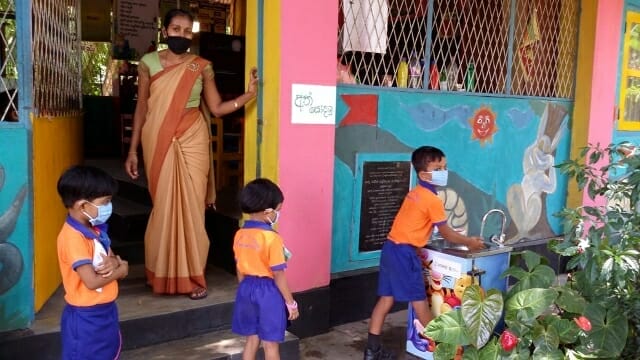News > Blog
Making Schools Safer for Children to Return During COVID-19 in Sri Lanka
Published 08/24/2020 by Global Communities

By Kathya de Silva Senarath, Reporting Officer, USAID SCORE Program in Sri Lanka
As thousands of children returned to school in August following five months of closure, an initiative supported by the United States has helped disinfect schools and ensure a healthy learning environment for Sri Lankan students.
In cooperation with regional health and education directors, medical officers, and school development executive committees, the project disinfected 180 schools in 14 districts in the Southern, Central, Uva, Eastern, North and North Central Provinces. This has enabled nearly 200,000 schoolchildren and teachers to resume their education safely.
“As schools reopen, the United States is working to safeguard the health of students and teachers, while giving parents the confidence to help their children return to school,” said U.S. Ambassador to Sri Lanka Alaina B. Teplitz. “We recognize the importance of protecting educational gains and the continuity of learning for all.”
The U.S. support, through the U.S. Agency for International Development (USAID), included power sprayers, personal protective equipment, thermal thermometer scanners, and labor costs for disinfection. The areas’ health authorities provided disinfection liquid to ensure that disinfection standards were maintained. USAID also provided schools with COVID-19 awareness posters for display.
“We had a very short time to complete the disinfection of schools since grades other than Ordinary and Advanced Levels were set to start soon after the elections. We can use the equipment we received for a long period and beyond COVID 19 to control infectious diseases such as dengue and influenza,” said Zonal Education Director in Galle, N. U. Priyani Daas.
Periyapuliyankulam School Principal V. Vikkineswaran also appreciated the U.S. assistance: “Our school is far away from the Mullaitivu town and people come from low income backgrounds. The support has made parents feel safe to send their children to school,” he said.
USAID earlier coordinated with 54 preschools to prevent the spread of COVID-19 in 11 districts. In addition to donating thermal temperature scanners and disposal bins, the United States funded sinks for handwashing and puppets to all preschools that can be used to educate preschoolers about COVID-19. Teachers attended trainings with guidance from child education specialists on engaging children with the help of the puppets on good hygiene and preventing the spread of COVID 19.
Over 2,000 preschoolers and 172 teachers are learning preventive methods for COVID-19. The support contributed to inculcate long lasting hygiene habits to teachers, preschoolers and their families.
“Moray Estate in Maskeliya, is very rural. They do not have much knowledge about COVID 19 prevention. So the support given by USAID is invaluable to protect our children and their families,” said Yogaprakash Harinprakash, 34, a preschool teacher.
These efforts were supported under USAID’s Social Cohesion and Reconciliation activity which helps populations in need through a mix of quick impact and long-term interventions.





